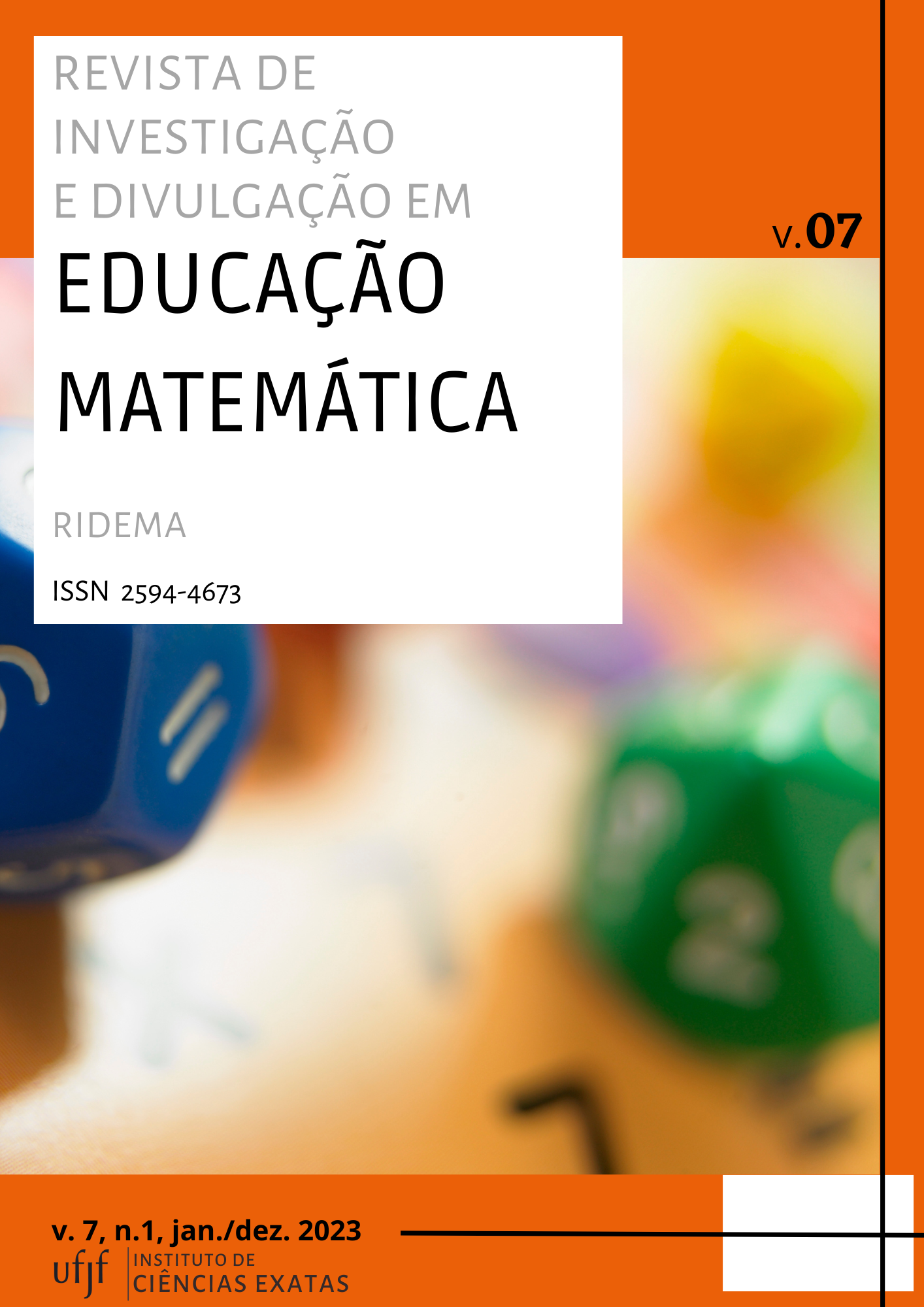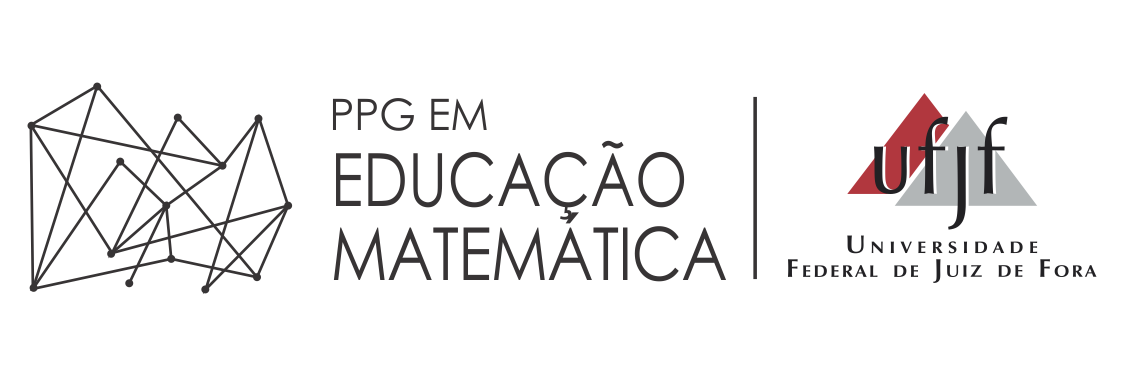Conhecimento de Futuros Professores em Probabilidades: relacionar acontecimentos disjuntos e complementares
DOI:
https://doi.org/10.34019/2594-4673.2023.v7.38955Palavras-chave:
Probabilidades, Acontecimentos disjuntos e complementares, Futuros professores, Primeiros anos escolaresResumo
No artigo estuda-se o conhecimento de estudantes, futuros professores dos primeiros anos escolares, sobre relações entre acontecimentos disjuntos e complementares a partir dos três objetivos: 1) Estudar o desempenho dos estudantes no reconhecimento da verdade/falsidade das relações enunciadas entre acontecimentos disjuntos e complementares; 2) Caracterizar as justificações apresentadas pelos estudantes para afirmar a verdade/falsidade das relações enunciadas; e 3) Retirar consequências para a formação em Probabilidades dos futuros professores dos primeiros anos. Participaram no estudo 37 estudantes do 2.º ano do curso de Licenciatura em Educação Básica, que frequentavam uma universidade do norte de Portugal. Os dados do estudo são as respostas dadas pelos estudantes a uma tarefa envolvendo relações entre acontecimentos disjuntos e complementares. Em termos de resultados, verificou-se um desempenho razoável dos estudantes em termos da verdade/falsidade das relações, o qual se agravou muito em termos de justificações.
Downloads
Metrics
Referências
AUSUBEL, D.; NOVAK, J.; HANESIAN, H. Psicologia educacional. Rio de Janeiro: Interamericana, 1980.
BATANERO, C. La comprensión de la probabilidad en los niños: ¿Qué podemos aprender de la investigación? In: FERNANDES, J. A.; CORREIA, P. F.; MRTINHO, M. H.; VISEU, F. (Eds.). ATAS DO III ENCONTRO DE PROBABILIDADES E ESTATÍSTICA NA ESCOLA, Braga, 2013. Proceedings… Braga: Centro de Investigação em Educação da Universidade do Minho, 2013. p. 9-21.
BATANERO, C.; ÁLVAREZ, R. A.; HERNÁNDEZ, L. A. S.; GEA, M. M. S. El inicio del razonamiento probabilístico en educación infantil. PNA Revista de Investigación en Didáctica de la Matemática, Granada, v. 15, n. 4, p. 267-288, 2021.
BRASIL. Base Nacional Comum Curricular - Educação é a Base. Brasília: Ministério da Educação, 2018.
FERNANDES, J. A. Compreensão de futuros professores dos efeitos nas medidas de tendência central ao se acrescentar novos dados a um conjunto. Bolema, Rio Claro, v. 35, n. 71, p. 1825-1844, 2021.
FERNANDES, J. A. Intuições e aprendizagem de probabilidades: uma proposta de ensino de probabilidades no 9.º ano de escolaridade. Tese (Doutoramento em Educação – Metodologia do Ensino da Matemática), Universidade do Minho, Braga, 2000.
FERNANDES, J. A. Probabilidade de acontecimentos envolvendo aspetos lógicos. Bolema, Rio Claro, v. 32, n. 60, p. 172-190, 2018.
FERNANDES, J. A. Classificação, definição e formulação de acontecimentos disjuntos por futuros professores dos primeiros anos escolares. Revista de Educación Estadística, in press.
FERNANDES, J. A.; BARROS, P. M. Dificuldades de futuros professores do 1.º e 2.º ciclos em estocástica. In: CONGRESSO IBERO-AMERICANO DE EDUCAÇÃO MATEMÁTICA (CIBEM), 5, 2005, Porto. Anais... Porto: Faculdade de Ciências da Universidade do Porto, 2005.
FERNANDES, J. A.; BARROS, P. M. Definir acontecimentos incompatíveis, complementares e independentes. Indagatio Didactica, Aveiro, v. 13, n. 1, p. 31-42, 2021.
FERNANDES, J. A.; FREITAS, A. Selection and Application of graphical and numerical statistical tools by prospective primary school teachers. Acta Scientiae, Canoas, v. 21, n. 6, p. 82-97, 2019.
FERNANDES, J. A.; GEA, M. M.; CORREIA, P. F. Definição de acontecimentos certos na extração de berlindes de um saco. Acta Scientiae, Canoas, v. 18, n. 1, p. 83-100, 2016.
FISCHBEIN, E.; Gazit, A. Does the teaching of probability improve probabilistic intuitions? Educational Studies in Mathematics, Dordrecht, v. 15, n. 1, p. 1-24, 1984.
FISCHBEIN, E.; NELLO; M. S.; MARINO, M. S. Factors affecting probabilistic judgments in children and adolescents. Educational Studies in Mathematics, Dordrecht, v. 22, n. 6, p. 523-549, 1991.
GREEN., D. R. Probability concepts in 11-16 year old pupils. Centre for Advancement of Mathematical Education in Technology, Loughborough University of Technology, 1982.
MINISTÉRIO DA EDUCAÇÃO E CIÊNCIA. Programa e Metas Curriculares de Matemática A. Lisboa: Autor, 2014.
MINISTÉRIO DA EDUCAÇÃO. Aprendizagens Essenciais do Ensino Básico ─ Matemática. Lisboa, 2018.
MINISTERIO DE EDUCATIÓN, CULTURA Y DEPORTE. Real Decreto 126/2014, de 28 de febrero, por el que se establece el currículo básico de la Educación Primaria. Madrid: Autor, 2014.
NATIONAL COUNCIL OF TEACHERS OF MATHEMATICS. Princípios e normas para a Matemática escolar. Lisboa: Associação de Professores de Matemática e Instituto de Inovação Educacional, 2007.
NIKIFORIDOU, Z.; PANGE, J. The notions of chance and probabilities in preschoolers. Early Childhood Education Journal, Abingdon, v. 38, n 4, p. 305-311, 2010.
OLIVEIRA JÚNIOR, A. P.; NETO, D. F. B.; SAITO, S. Evaluating Independent and Mutually Exclusive Event Concepts in the Thinking of Higher Education Students, Acta Scientiae, Canoas, v. 24, n. 5, p. 27-53, 2022.
ORTIZ, J. J.; MOHAMEND, N. Conocimiento de futuros profesores sobre espacio muestral. Quadrante, Lisboa, v. 23, n. 2, 5-22, 2014.



























